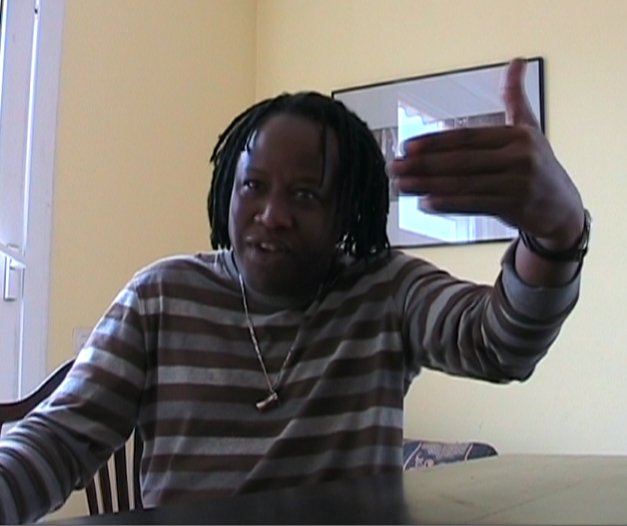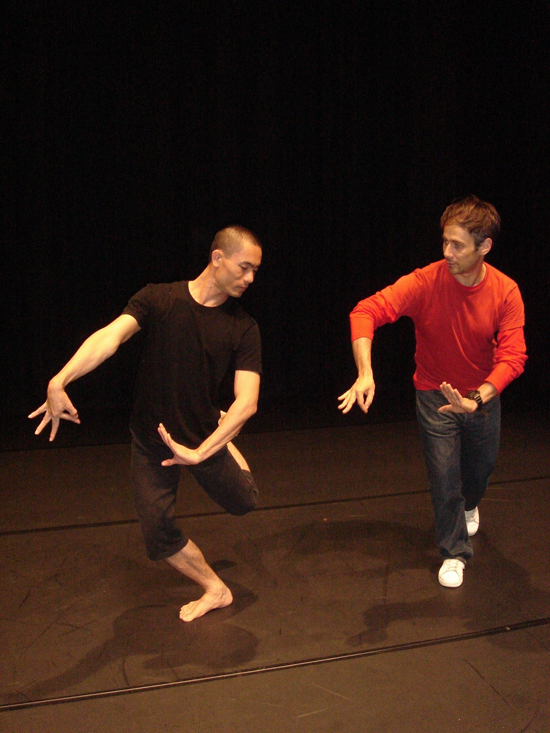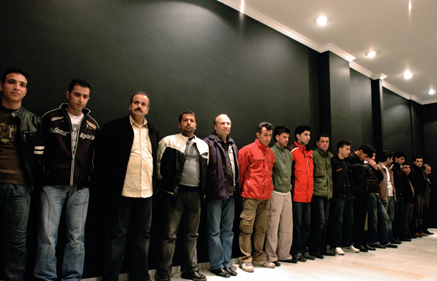
Erika Fischer-Lichte and Rustom Bharucha, August 6, 2011
To welcome the new Fellows to the International Research Centre “Interweaving Performance Cultures”, Erika Fischer-Lichte and Christel Weiler convened a meeting at the beginning of the academic year 2010/11 to discuss the Centre’s programme and concepts. The following conversation between Erika Fischer-Lichte and Rustom Bharucha about “interweaving” versus “intercultural” took place on this occasion. 

Gastón A. Alzate, June 21, 2011
 In this interview with Gastón Alzate, Souleymane Mbodj discusses several issues relating to the interweaving of performing cultures. These include the unity of literature and the performing arts in Africa; his views on African and Western philosophy; his experience playing Bach’s second prelude in C minor with Lebanese and Armenian musicians; the appropriation processes and cultural fractures resulting from colonization; and the essential value of black music in the Americas for African communities to recover cultural ties shattered by the slave trade. He shares his thoughts on the crossroads and divergences between Africa and the West regarding ways of thinking and conceptions of art.
In this interview with Gastón Alzate, Souleymane Mbodj discusses several issues relating to the interweaving of performing cultures. These include the unity of literature and the performing arts in Africa; his views on African and Western philosophy; his experience playing Bach’s second prelude in C minor with Lebanese and Armenian musicians; the appropriation processes and cultural fractures resulting from colonization; and the essential value of black music in the Americas for African communities to recover cultural ties shattered by the slave trade. He shares his thoughts on the crossroads and divergences between Africa and the West regarding ways of thinking and conceptions of art. 
 In this interview with Gastón Alzate, Souleymane Mbodj discusses several issues relating to the interweaving of performing cultures. These include the unity of literature and the performing arts in Africa; his views on African and Western philosophy; his experience playing Bach’s second prelude in C minor with Lebanese and Armenian musicians; the appropriation processes and cultural fractures resulting from colonization; and the essential value of black music in the Americas for African communities to recover cultural ties shattered by the slave trade. He shares his thoughts on the crossroads and divergences between Africa and the West regarding ways of thinking and conceptions of art.
In this interview with Gastón Alzate, Souleymane Mbodj discusses several issues relating to the interweaving of performing cultures. These include the unity of literature and the performing arts in Africa; his views on African and Western philosophy; his experience playing Bach’s second prelude in C minor with Lebanese and Armenian musicians; the appropriation processes and cultural fractures resulting from colonization; and the essential value of black music in the Americas for African communities to recover cultural ties shattered by the slave trade. He shares his thoughts on the crossroads and divergences between Africa and the West regarding ways of thinking and conceptions of art. 
Gabriele Brandstetter, June 1, 2011
 In my paper, I would like to look at dance as an art form within the context of intercultural encounters. Discourses on dance often betray an underlying assumption that dance is universal and can be understood by anyone, everywhere - dance as a global player! But even just a cursory glance at the history and the diversity of forms in different cultures reveals that dance performs culturally specific, regional, and local conceptions of the body, of interaction, and of rhythmic staging. On the one hand, dance performances invite (kinesthetic) identification and an inclusive participation; on the other, they can also induce experiences of difference, exclusion, or transgression. What experience, what specific knowledge is embodied in dance, dance techniques, and choreographic performances? To what extent does this describe a "knowledge of the human being" that can be portrayed only performatively - through body movements, interactions, and space-time-models?
In my paper, I would like to look at dance as an art form within the context of intercultural encounters. Discourses on dance often betray an underlying assumption that dance is universal and can be understood by anyone, everywhere - dance as a global player! But even just a cursory glance at the history and the diversity of forms in different cultures reveals that dance performs culturally specific, regional, and local conceptions of the body, of interaction, and of rhythmic staging. On the one hand, dance performances invite (kinesthetic) identification and an inclusive participation; on the other, they can also induce experiences of difference, exclusion, or transgression. What experience, what specific knowledge is embodied in dance, dance techniques, and choreographic performances? To what extent does this describe a "knowledge of the human being" that can be portrayed only performatively - through body movements, interactions, and space-time-models? 
 In my paper, I would like to look at dance as an art form within the context of intercultural encounters. Discourses on dance often betray an underlying assumption that dance is universal and can be understood by anyone, everywhere - dance as a global player! But even just a cursory glance at the history and the diversity of forms in different cultures reveals that dance performs culturally specific, regional, and local conceptions of the body, of interaction, and of rhythmic staging. On the one hand, dance performances invite (kinesthetic) identification and an inclusive participation; on the other, they can also induce experiences of difference, exclusion, or transgression. What experience, what specific knowledge is embodied in dance, dance techniques, and choreographic performances? To what extent does this describe a "knowledge of the human being" that can be portrayed only performatively - through body movements, interactions, and space-time-models?
In my paper, I would like to look at dance as an art form within the context of intercultural encounters. Discourses on dance often betray an underlying assumption that dance is universal and can be understood by anyone, everywhere - dance as a global player! But even just a cursory glance at the history and the diversity of forms in different cultures reveals that dance performs culturally specific, regional, and local conceptions of the body, of interaction, and of rhythmic staging. On the one hand, dance performances invite (kinesthetic) identification and an inclusive participation; on the other, they can also induce experiences of difference, exclusion, or transgression. What experience, what specific knowledge is embodied in dance, dance techniques, and choreographic performances? To what extent does this describe a "knowledge of the human being" that can be portrayed only performatively - through body movements, interactions, and space-time-models? 
Thomas Martius, May 23, 2011
Gastón A. Alzate, April 13, 2011
I see "interweaving performance cultures" as a flexible perspective to inquire into the cultural adjustments, ambiguities, and misalignments performative events produce and manifest. I consider it meaningful that performance is mentioned instead of art – although art is certainly included – which shows such inquiries are not circumscribed to an elitist definition of art nor to a field with the official approval stamp of the academies. Thus, "interweaving performance cultures" in my view refers to a rigorous inquiry into the cultural complexities of human actions – as creative forms that enter into a dialogical relationship with others – that does not start from a single prescribed ideological, philosophical, aesthetic, or theoretical model. 

Natascha Siouzouli, March 21, 2011
 In 2006 the famous Greek theatre director and founder of the Attis-Theatre (Athens) Theodoros Terzopoulos presented a short performance entitled Jenin (based on the poem of the same name by Etel Adnan). Terzopoulos staged the performance as a parcours that began in an Arabic coffee shop near his theatre and encompased the entire theatre space, including the foyer, the space beneath the seats, the stage itself, the rear exit, etc. The performance could best be described as a kind of silent dealing with the other that remains unincorporated. Drawing upon this experience, we talked about alterity, encounters and the power of the others.
In 2006 the famous Greek theatre director and founder of the Attis-Theatre (Athens) Theodoros Terzopoulos presented a short performance entitled Jenin (based on the poem of the same name by Etel Adnan). Terzopoulos staged the performance as a parcours that began in an Arabic coffee shop near his theatre and encompased the entire theatre space, including the foyer, the space beneath the seats, the stage itself, the rear exit, etc. The performance could best be described as a kind of silent dealing with the other that remains unincorporated. Drawing upon this experience, we talked about alterity, encounters and the power of the others. 
 In 2006 the famous Greek theatre director and founder of the Attis-Theatre (Athens) Theodoros Terzopoulos presented a short performance entitled Jenin (based on the poem of the same name by Etel Adnan). Terzopoulos staged the performance as a parcours that began in an Arabic coffee shop near his theatre and encompased the entire theatre space, including the foyer, the space beneath the seats, the stage itself, the rear exit, etc. The performance could best be described as a kind of silent dealing with the other that remains unincorporated. Drawing upon this experience, we talked about alterity, encounters and the power of the others.
In 2006 the famous Greek theatre director and founder of the Attis-Theatre (Athens) Theodoros Terzopoulos presented a short performance entitled Jenin (based on the poem of the same name by Etel Adnan). Terzopoulos staged the performance as a parcours that began in an Arabic coffee shop near his theatre and encompased the entire theatre space, including the foyer, the space beneath the seats, the stage itself, the rear exit, etc. The performance could best be described as a kind of silent dealing with the other that remains unincorporated. Drawing upon this experience, we talked about alterity, encounters and the power of the others. 
Kai Tuchmann, March 7, 2011
The Kulturstiftung des Bundes funds collaborations between city theatres in Germany and theatres from abroad. The Mainfranken Theater in Würzburg has started a collaboration with the Burkinan C.I.T.O. Theatre. Kai Tuchmann, currently executive dramaturge of the Mainfranken Theater, reflects on this international collaboration. 

Friederike Felbeck, February 22, 2011
In 1963, the Polish novelist and dramatist Witold Gombrowicz sailed from South America to Europe. He was bound for Berlin, where he was to take up a Ford Foundation fellowship, the first of a series of artist residencies meant to initiate a cultural revival of the recently divided city. For Gombrowicz, it was his first journey to Europe in twenty-three years. In his journal, he describes an extraordinary encounter: at the break of dawn, northeast of the Canary Islands, he sees in a distance the ship of Chrobry, sailing on her maiden voyage from the Polish harbor Gdynia to Argentina. Gombrowicz was on board as a correspondent. Bound to spend a short period abroad and then return. 











